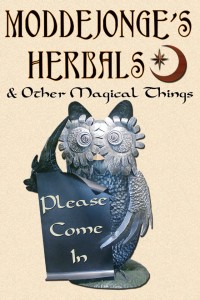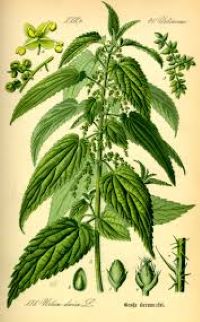March Herb of the Month
 March Herb of the Month is Nettle. Written and permission granted by Lynn Moddejonge of Moddejonge’s Herbals and Other Magical Things in Everett, Washington.
March Herb of the Month is Nettle. Written and permission granted by Lynn Moddejonge of Moddejonge’s Herbals and Other Magical Things in Everett, Washington.
“Nettle”
By Lynn Moddejonge
Moddejonge’s Herbals and other Magical Things
As a result, Nettle has been used for centuries to treat allergy symptoms, particularly hay fever which is the most common allergy problem. It contains biologically active compounds that reduce inflammation. Dr. Andrew Wiel M.D. author of Natural Health/ Natural Medicine says he knows of nothing more effective than nettle for allergy relief. And his statement is backed up by studies at the National College of Naturopathic Medicine in Portland, Oregon.
For example, decongestants, antihistamines, allergy shots and even prescription medications such as Allegra and Claritin treat only the symptoms of allergies and tend to lose effectiveness over a period of time. They can also cause drowsiness, dry sinuses, insomnia and high blood pressure. Nettle has none of these side effects. It can be used on a regular basis and has an impressive number of other benefits most notably as a treatment for prostate enlargement.
Nettle has been studied extensively and has shown promise in treating Alzheimer’s disease, arthritis, asthma, bladder infections, bronchitis, bursitis, gingivitis, gout, hives, kidney stones, laryngitis, multiple sclerosis, PMS, prostate enlargement, sciatica, and tendinitis!
Externally it has been used to improve the appearance of the hair, and is said to be a remedy against oily hair and dandruff.
Nettle root is recommended as a diuretic
 Meanwhile, in Germany today stinging nettle is sold as an herbal drug for prostate diseases and as a diuretic. It is a common ingredient in other herbal drugs produced in Germany for rheumatic complaints and inflammatory conditions (especially for the lower urinary tract and prostate). In the United States many remarkable healing properties are attributed to nettle and the leaf is utilized for different problems than the root. The leaf is used here as a diuretic, for arthritis, prostatitis, rheumatism, rheumatoid arthritis, high blood pressure and allergic rhinitis.
Meanwhile, in Germany today stinging nettle is sold as an herbal drug for prostate diseases and as a diuretic. It is a common ingredient in other herbal drugs produced in Germany for rheumatic complaints and inflammatory conditions (especially for the lower urinary tract and prostate). In the United States many remarkable healing properties are attributed to nettle and the leaf is utilized for different problems than the root. The leaf is used here as a diuretic, for arthritis, prostatitis, rheumatism, rheumatoid arthritis, high blood pressure and allergic rhinitis.
Hence, the root is recommended as a diuretic, for relief of benign prostatic hyperplasia (BPH) and other prostate problems, and as a natural remedy to treat or prevent baldnessIn foods, young stinging nettle leaves are eaten as a cooked vegetable. In manufacturing, stinging nettle extract is used as an ingredient in hair and skin products.
Stinging nettle leaf has a long history of use. It was used primarily as a diuretic and laxative in ancient Greek times.
Special Precautions & Warnings:
Pregnancy and breast-feeding: Stinging nettle is LIKELY UNSAFE to take during pregnancy. It might stimulate uterine contractions and cause a miscarriage. It’s also best to avoid stinging nettle if you are breast-feeding.
Diabetes: There is some evidence stinging nettle above ground parts can decrease blood sugar levels. It might increase the chance of low blood sugar in people being treated for diabetes. Monitor your blood sugar carefully if you have diabetes and use stinging nettle.
High blood pressure: There is some evidence that stinging nettle above ground parts might lower blood pressure. If you are taking blood pressure medications along with stinging nettle, your blood pressure might drop too low. If you have high blood pressure, discuss stinging nettle with your healthcare provider before starting it.